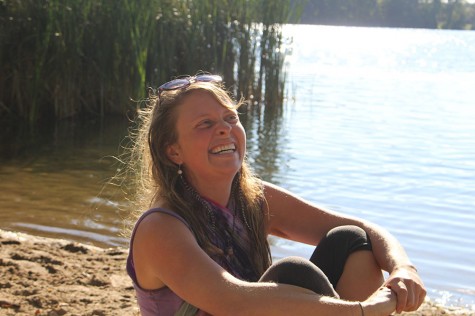Into Hidden Beach
September 26, 2014
After spending the better part of an hour driving confusedly about the east side of Cedar Lake (consequently circling the entire lake), I turn a corner to find myself trailing a group of three teenagers clad in army surplus jackets and bags. Trusting their destination to be Hidden Beach, I park in front of a geometric house and follow them at an acceptable distance. Their laughter echoes back to me as they parade through the diverse terrain; upper class neighborhood turns to weedy railroad crossing and winding path.
Abruptly, the narrow footpath––in an expression of confinement––releases itself into a vast, open cavity of sand and concrete and trampled brush. The gritty, happy trio is immediately greeted with booming warmth and gusto by a body in a hammock at the far end of the beach.
“Haay!” it fumbles. “The party’s over here!” They run to the party, and I sit at a heavily graffitied picnic table.
Hidden Beach––not The Hidden Beach, as regulars will promptly correct you––has come to be recognized as a sanctum for hippies, runaways, or anyone with a certain amount of angst and established love for life. Its notorious nightlife of drugs, drink, and general debauchery has been the allure for several generations and has made it the center of urban legend in Minneapolis and the surrounding suburbs. Long story short, this reputation doesn’t hold well with the beach’s neighbors, as it is in fact ‘hidden’ by one of the wealthiest neighborhoods of Minneapolis. The neighbors have consequently been involved for several years in an effort to either uncover the beach to the public, or shut it down entirely.
Upon asking an actual neighborhood resident for her scathing opinion of the beach, however, I received a much more understanding and important answer than I expected. “I don’t think they should shut it down. It’s such a beautiful space and so many people use it for so many different things. I just think the younger generations need to be more respectful and the older generations need to be more understanding,” she said.

“People need to come here and connect with the water, and connect with the trees to stay sane–or insane–whichever you prefer,” said Allie.
Allie, an apparent beach regular who I found playing the ukelele and singing songs with a stranger, says something surprisingly similar: “They can’t shut it down; this land is for everyone. People need to come here and connect with the water, and connect with the trees to stay sane–or insane–whichever you prefer.” I ask to take her picture and she assents; her companion, however apprises me earnestly of his opposition to photographs and of their effect on the human soul.
A woman in sports attire timidly wades in the water and does so for several minutes. A middle-aged man rides up on a bicycle and joins her. A clean-cut young man sits on a tree stump and stares at the sand. An elderly man resembling a black Walt Whitman pulls up on a motorcycle, sits under a tree, and stares at me.
Fancying this man to be some sort of legendary beach elder, I approach him nervously. I am given severe advice that eventually evolves itself into something like this: “Tha’s the problem with most Americans. They don’ just sit back and think. I was telling my coworkers today how everything goes back to heaven––the dollar sign, the evil eye––all that stuff goes back to Egypt. And they just looked at me dumbfounded and I’m like, ‘Yeah, with all your education, you can’t see what’s right in front of you.’”
My original guides begin to laugh their way back up the path that led us here; and this, to me, comes across as some kind of transcendental signal––something to do with the atmosphere of the beach––telling me it is time to leave.
On a lifeless day like today, all people seem to do here is sit, hunched over, and stare at the lake, or ever-so-slowly wade into the water. I start thinking maybe it has something to do with the looming threat of a disrupted environment––however, as I struggle to retrace my steps away from Hidden Beach, a bicycle races towards me. The rider doesn’t slow as he navigates his way through the winding footpath; nor does he slow as he approaches me. The air is disrupted as he whizzes past me and abruptly turns his head. I receive a farewell on the behalf of Hidden Beach––a bone-shaking, primal scream.


Mick Hawkins • Sep 26, 2014 at 7:26 pm
Really well written, Adam. Your talent is so obvious. I am looking
forward to the rest of the school year and your articles.
M. Hawkins